|
|
|
Sort Order |
|
|
|
Items / Page
|
|
|
|
|
|
|
| Srl | Item |
| 1 |
ID:
154645
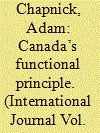

|
|
|
|
|
| Summary/Abstract |
On 29 March 2016, in a speech at the University of Ottawa, Stéphane Dion outlined “the guiding principle” that he intended to follow as the Trudeau government’s first minister of global affairs. He called it “responsible conviction”: an approach to policymaking that combined the need to balance his personal sense of right and wrong with a pragmatic understanding of the consequences of Ottawa’s policy choices. The decision to announce Canada’s new global posture so publicly recalls the conduct of the Canadian foreign policy establishment during the Second World War, when Ottawa first proclaimed its allegiance to another decision-making framework: the functional principle. This brief essay reviews the history and utility of the Canadian version of functionalism with an eye to drawing lessons for Minister Dion’s successor, Chrystia Freeland, and her contemporaries. Understanding the ultimate plight of the functional principle might make the new minister less adamant about placing responsible conviction at the centre of her foreign policy platform.
|
|
|
|
|
|
|
|
|
|
|
|
|
|
|
|
| 2 |
ID:
121183
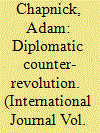

|
|
|
| 3 |
ID:
088744
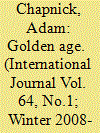

|
|
|
| 4 |
ID:
121238
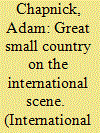

|
|
|
|
|
| Publication |
2012.
|
| Summary/Abstract |
In 1952, the Carnegie Endowment for International Peace thought it
worthwhile to commission a series of national studies on the United Nations
(UN). In Canada, the task was taken on by Fred Soward, an academic and
former special assistant in the Department of External Affairs, and Edgar
McInnis, president of the Canadian Institute of International Affairs and a
delegate to the 1952 UN General Assembly.1
Four years later, Canada and the
United Nations was released to uniformly positive reviews.2
|
|
|
|
|
|
|
|
|
|
|
|
|
|
|
|
| 5 |
ID:
097049
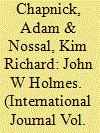

|
|
|
| 6 |
ID:
189886
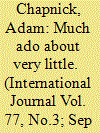

|
|
|
|
|
| Summary/Abstract |
Ever since Canada failed to be elected to the United Nations Security Council as a non-permanent member in June 2020, there have been calls for Ottawa to realign Canadian foreign policy with the national interest. It is hardly the first time that such a plea has been made: critics advocated similarly in the 1870s, the 1930s, the 1960s, and the 2000s. Yet, in each case, they recommended a different policy solution. Having reviewed these episodes, this essay concludes that the real debate in Canadian foreign policy has never been about the national interest, per se. To borrow from the language of strategy, Ottawa’s critics have merely privileged different “ways” of achieving the same “ends,” while everyone yearns for the “means” to do more.
|
|
|
|
|
|
|
|
|
|
|
|
|
|
|
|
| 7 |
ID:
167215
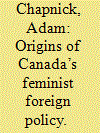

|
|
|
|
|
| Summary/Abstract |
In January 2019, a leading Canadian foreign policy blog, OpenCanada.org, declared that “[u]nder the government of Justin Trudeau, Canada has embraced a feminist foreign policy—gradually at first, and with fervor over the past year.” Although critics have debated the policy’s effectiveness, the embrace, if not also the fervor, was indisputable. By 2019, the Trudeau government’s second foreign minister, Chrystia Freeland, was proclaiming Canada’s feminist approach to international relations openly and regularly. The international community had also noticed. This article investigates the origins of the new Canadian foreign policy “brand.” It finds that, contrary to popular thinking, the prime minister himself played at most a minor role in the initiation of what became a full-fledged transformation of Canada’s global image.
|
|
|
|
|
|
|
|
|
|
|
|
|
|
|
|
| 8 |
ID:
068168
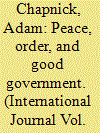

|
|
|
| 9 |
ID:
146497


|
|
|
|
|
| Summary/Abstract |
The study of Canada–United States relations has a long, rich history as an interdisciplinary project, closely engaged with contemporary policy debates, and well integrated in the teaching curricula at Canadian universities. As the two societies become ever more tightly enmeshed—economically, demographically, culturally, and even politically—and the two states’ diplomatic relationship becomes ever more complex, the study of that relationship can and should become more reflective, purposive, and coherent. Having reviewed recent historiographical developments, in which the field’s three core debates have been taken in important new directions, we are hopeful about the prospects for renewal and reinvention. The challenge for students of Canada–US relations today, we maintain, is therefore to continue to unearth insights from the original great debates but also to challenge and revise the broader debates themselves to develop a more robust understanding of the relationship past, present, and future.
|
|
|
|
|
|
|
|
|
|
|
|
|
|
|
|
| 10 |
ID:
102172
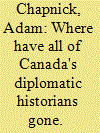

|
|
|
|
|
|
|
|